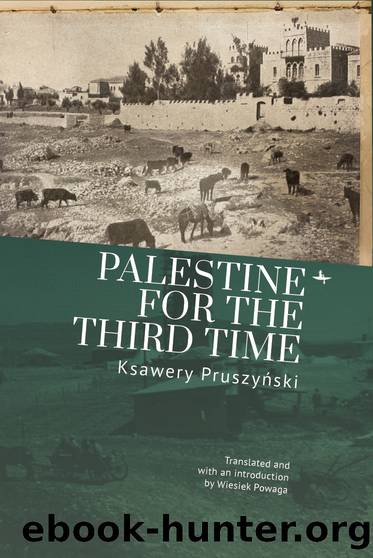Palestine for the Third Time by Ksawery Pruszyński

Author:Ksawery Pruszyński
Language: eng
Format: epub
Publisher: Kryon Publishing Services
Published: 2020-08-15T00:00:00+00:00
__________________
1Glass housesâa metaphorical image for the rise of modern Poland, which in 1918 regained independence after more than 120 years of partitions; originally used in Stefan Å»eromskiâs novel PrzedwioÅnie (The Coming Spring [Warszawa: Wydawnistwo J. Mortkowicza, 1925]) before entering the colloquial mainstream use as a mythical promise of a bright future that never arrived. (Transl.)
2Pinhas Rutenberg (1879â1942)âa Russian Jewish engineer, businessman, and political activist; he played an active role in two Russian revolutions, one of the founders of the Jewish Legion and the American Jewish Congress; founded the Palestine Electric Company, currently the Israel Electric Corporation. (Transl.) Before Pinhas Rutenberg became a Zionist, he was a Russian revolutionary of extreme views; apparently, in 1905, in a Finnish villa, he carried out the assassination of an agent provocateurâthe famous Gapon. (Author)
3Izrael Kalman PoznaÅski (1833â1900)âPolish Jewish businessman, textile magnate, and philanthropist in nineteenth-century Åódź, Poland; one of its three legendary âcotton kings.â (Transl.)
4Wieliczkaâa small town in southern Poland, near Cracow, famed for its Wieliczka Salt Mine, one of the worldâs oldest in continuous operation (from the mid thirteenth century until 2007; in 1978, it was designated a UNESCO World Heritage Site. (Transl.)
5[O]ld Barykaâthe father of Cezary Baryka, the main character in Å»eromskiâs The Coming Spring; he lived and worked in Baku, in imperial Russia, but longed for an independent Poland; after his death, his son Cezary arrived in Poland pursuing his fatherâs dream of return and reconstruction of the old country. (Transl.)
6Gaszyniec?âprobably the authorâs mistake or a typo for the name Gajowiec. (Transl.)
7Cukier krzepi! (Pol.)âa popular advertising campaign in prewar Poland, promoting the benefits of sugar, devised for the growing sugar industry; the slogan was invented by Melchior WaÅkowicz, the editor in chief of the Rój publishing house, another publisher of PruszyÅskiâs Palestine (Warszawa: Rój, 1936). (Transl.)
Download
This site does not store any files on its server. We only index and link to content provided by other sites. Please contact the content providers to delete copyright contents if any and email us, we'll remove relevant links or contents immediately.
Cecilia; Or, Memoirs of an Heiress — Volume 1 by Fanny Burney(32544)
Cecilia; Or, Memoirs of an Heiress — Volume 2 by Fanny Burney(31942)
Cecilia; Or, Memoirs of an Heiress — Volume 3 by Fanny Burney(31928)
The Great Music City by Andrea Baker(31915)
We're Going to Need More Wine by Gabrielle Union(19033)
All the Missing Girls by Megan Miranda(15944)
Pimp by Iceberg Slim(14481)
Bombshells: Glamour Girls of a Lifetime by Sullivan Steve(14050)
For the Love of Europe by Rick Steves(13894)
Talking to Strangers by Malcolm Gladwell(13345)
Norse Mythology by Gaiman Neil(13344)
Fifty Shades Freed by E L James(13232)
Mindhunter: Inside the FBI's Elite Serial Crime Unit by John E. Douglas & Mark Olshaker(9317)
Crazy Rich Asians by Kevin Kwan(9275)
The Lost Art of Listening by Michael P. Nichols(7488)
Enlightenment Now: The Case for Reason, Science, Humanism, and Progress by Steven Pinker(7306)
The Four Agreements by Don Miguel Ruiz(6744)
Bad Blood by John Carreyrou(6610)
Weapons of Math Destruction by Cathy O'Neil(6264)
